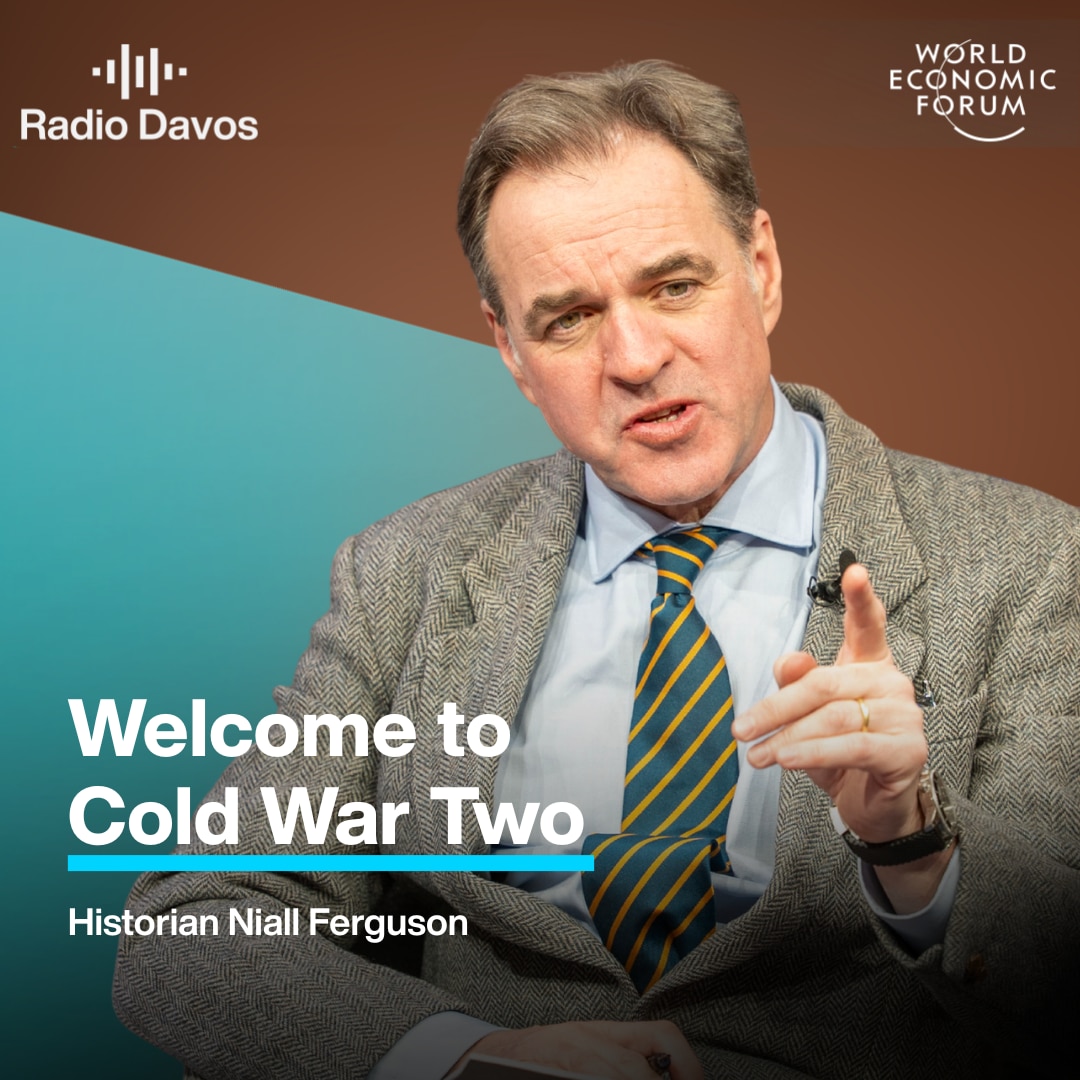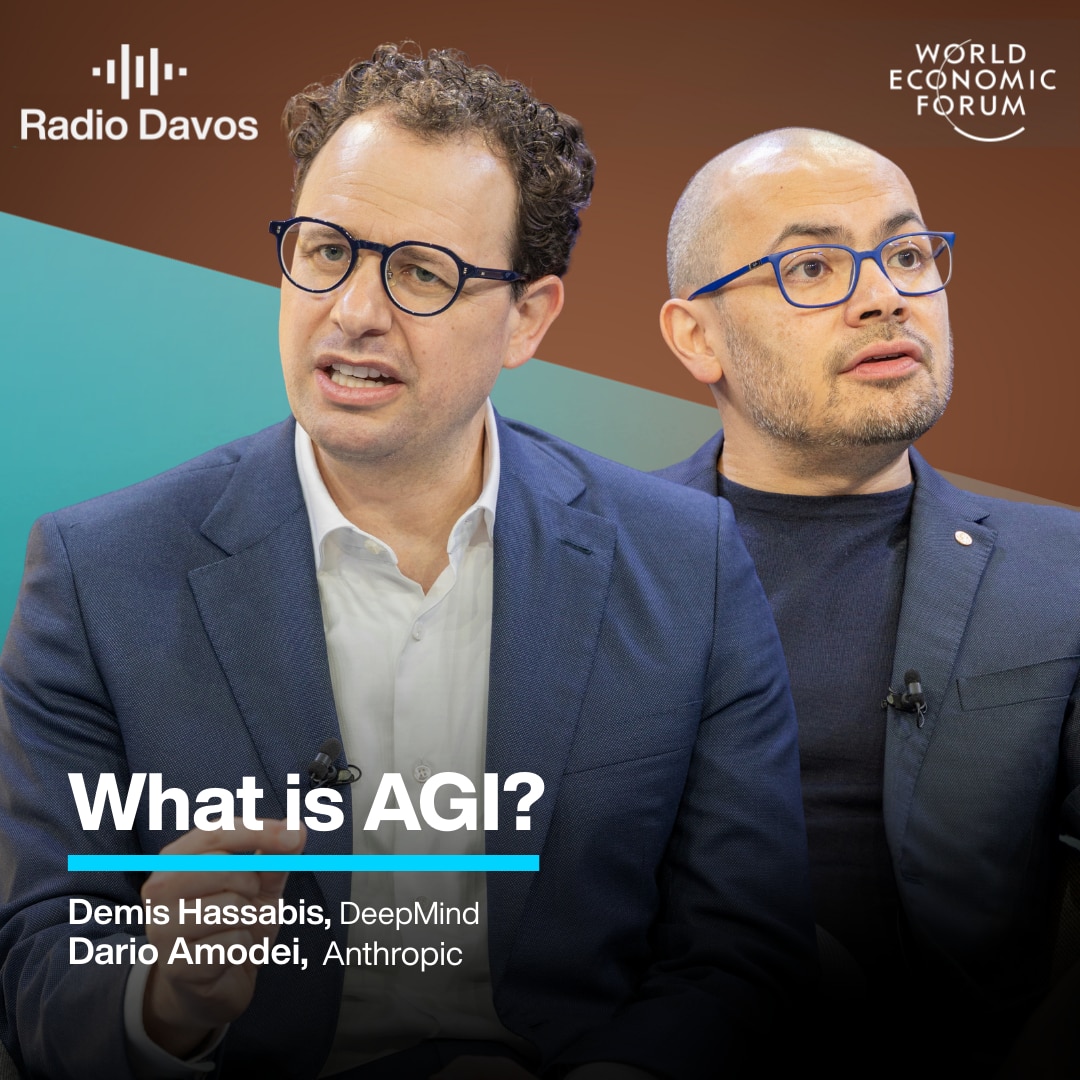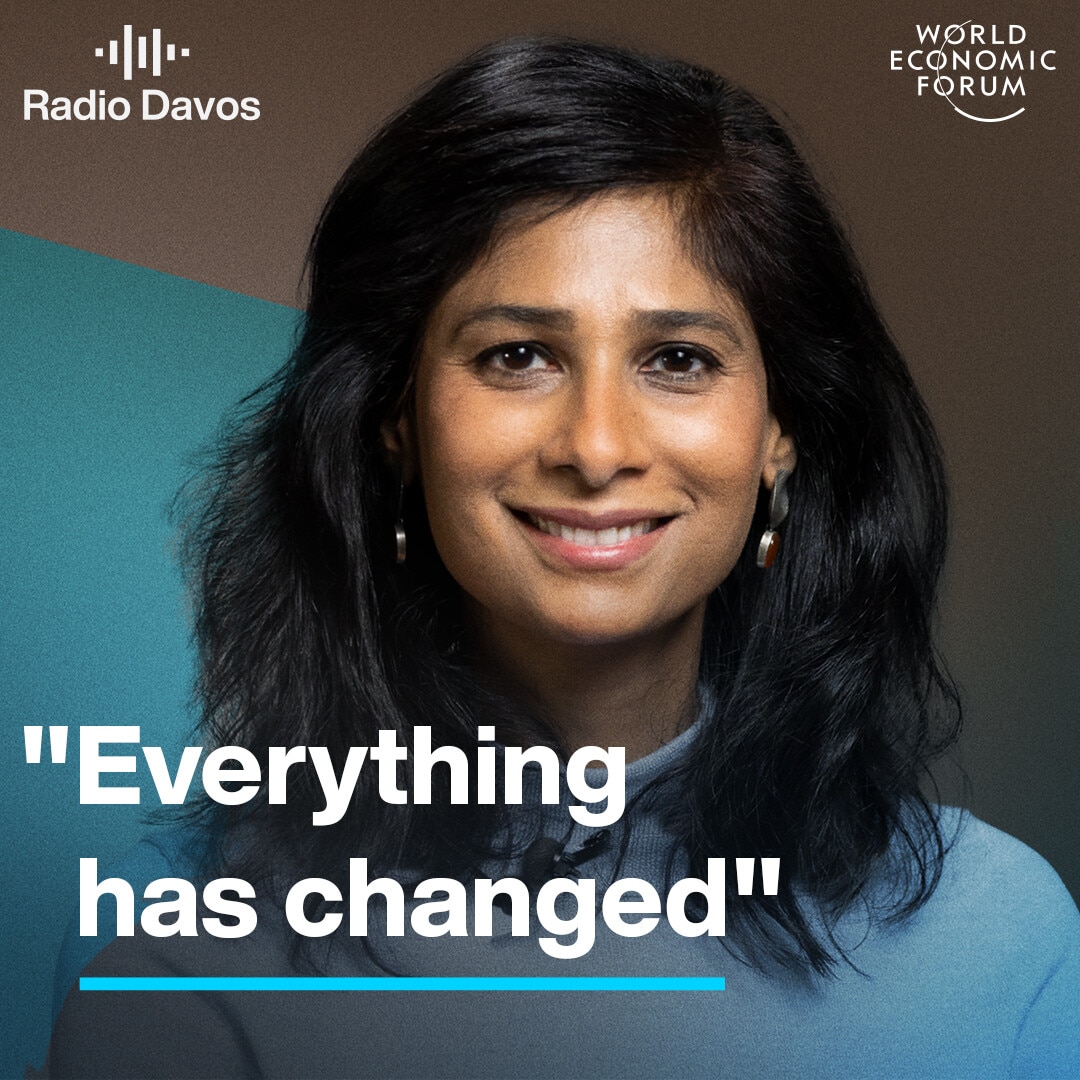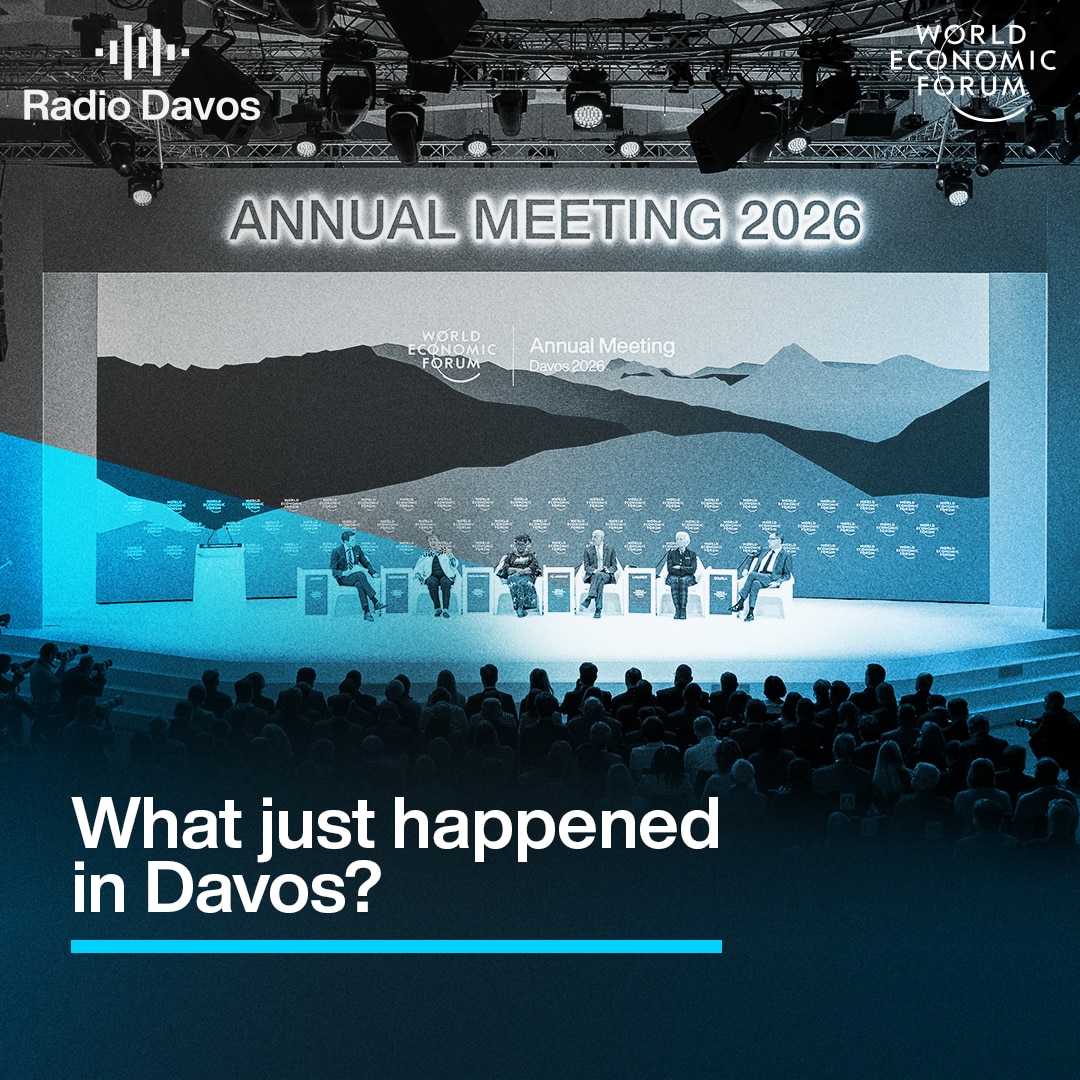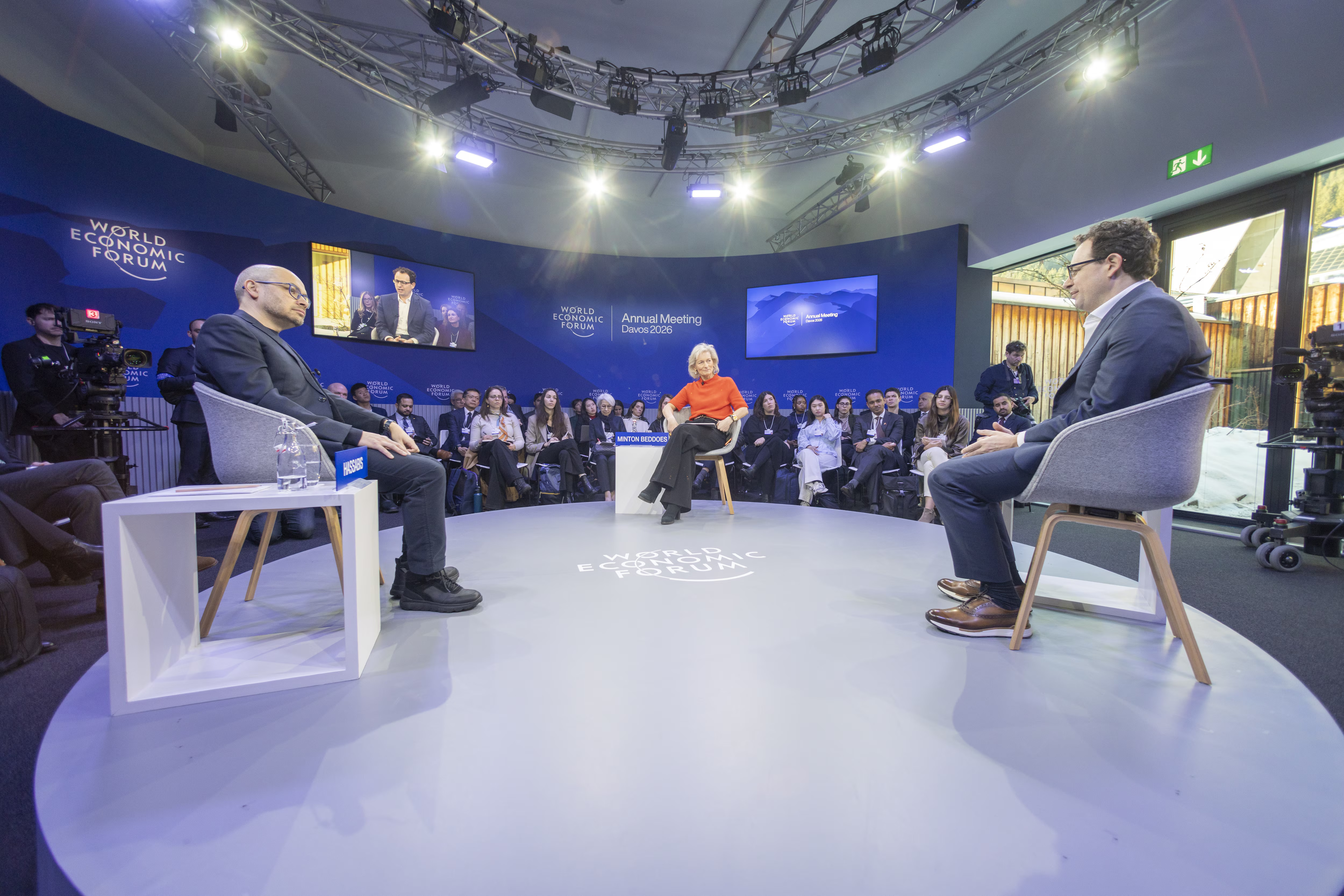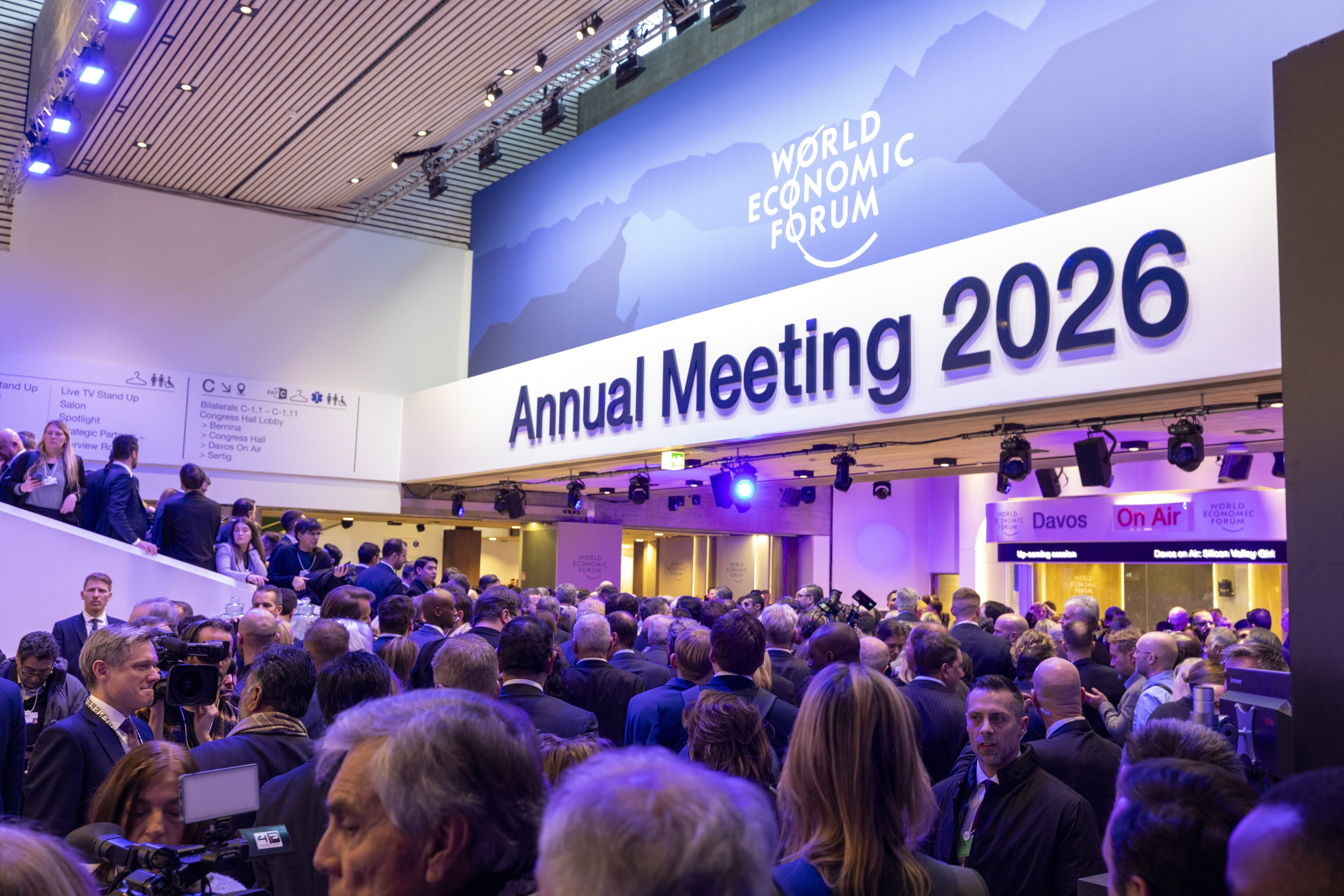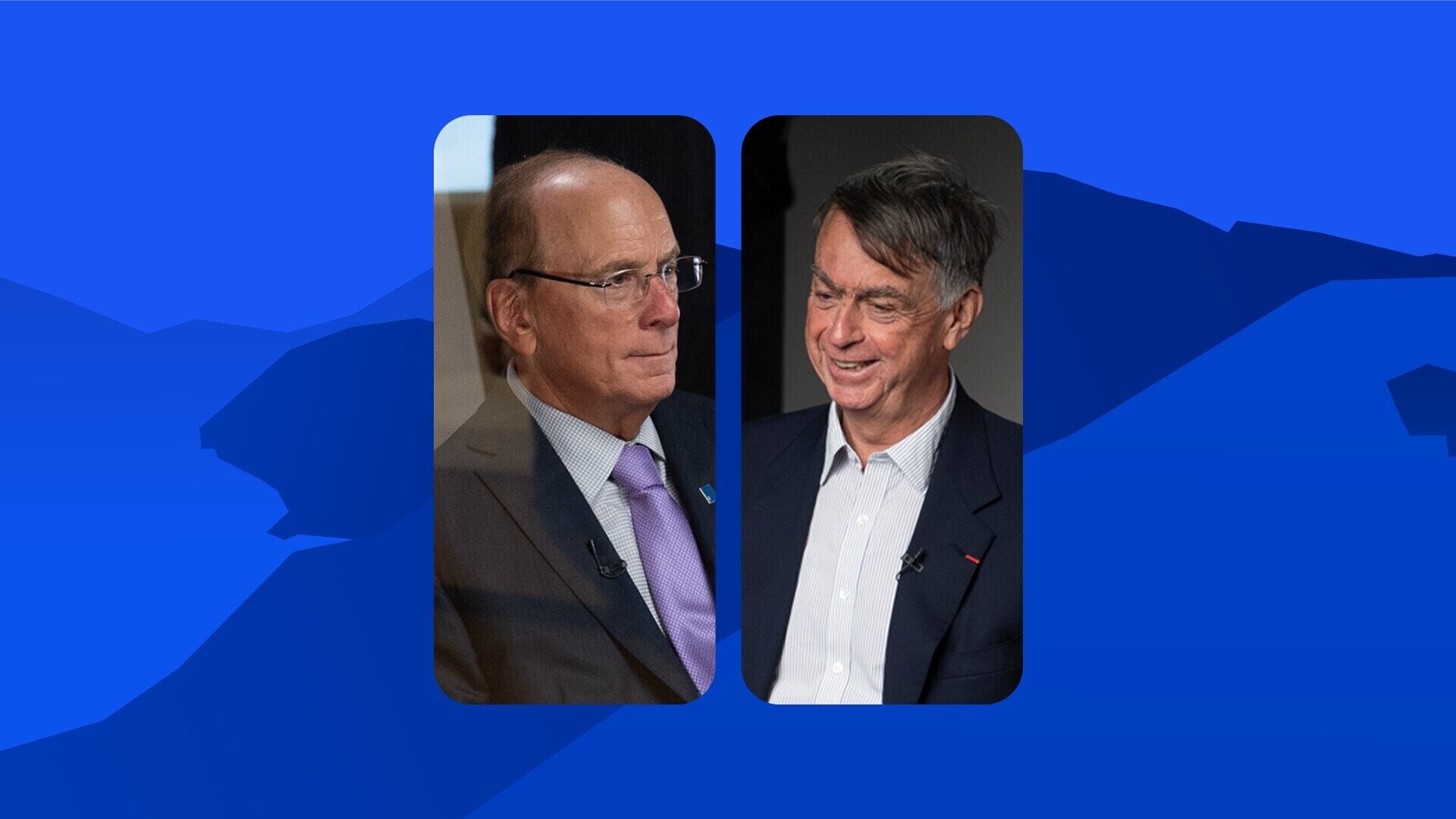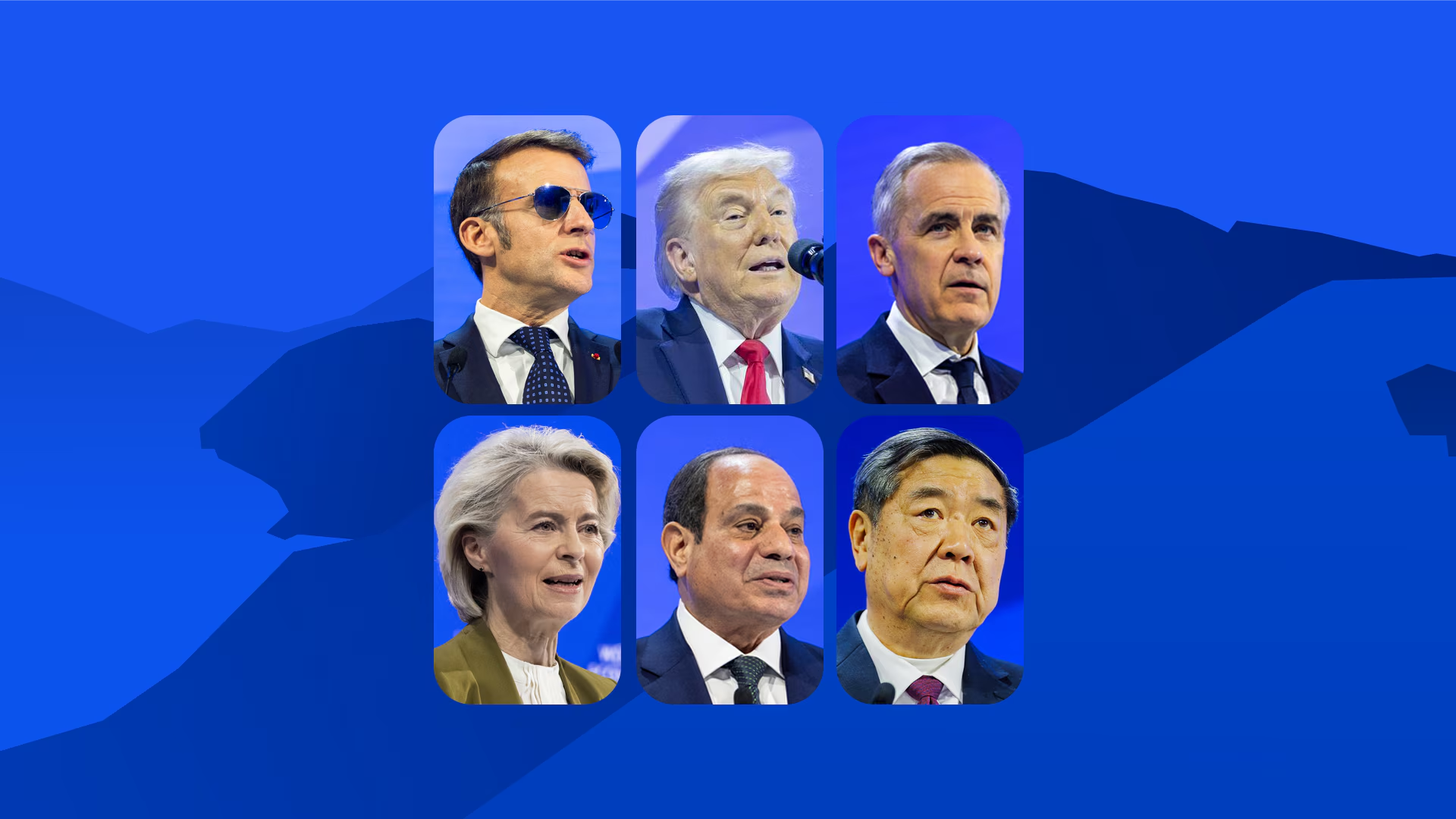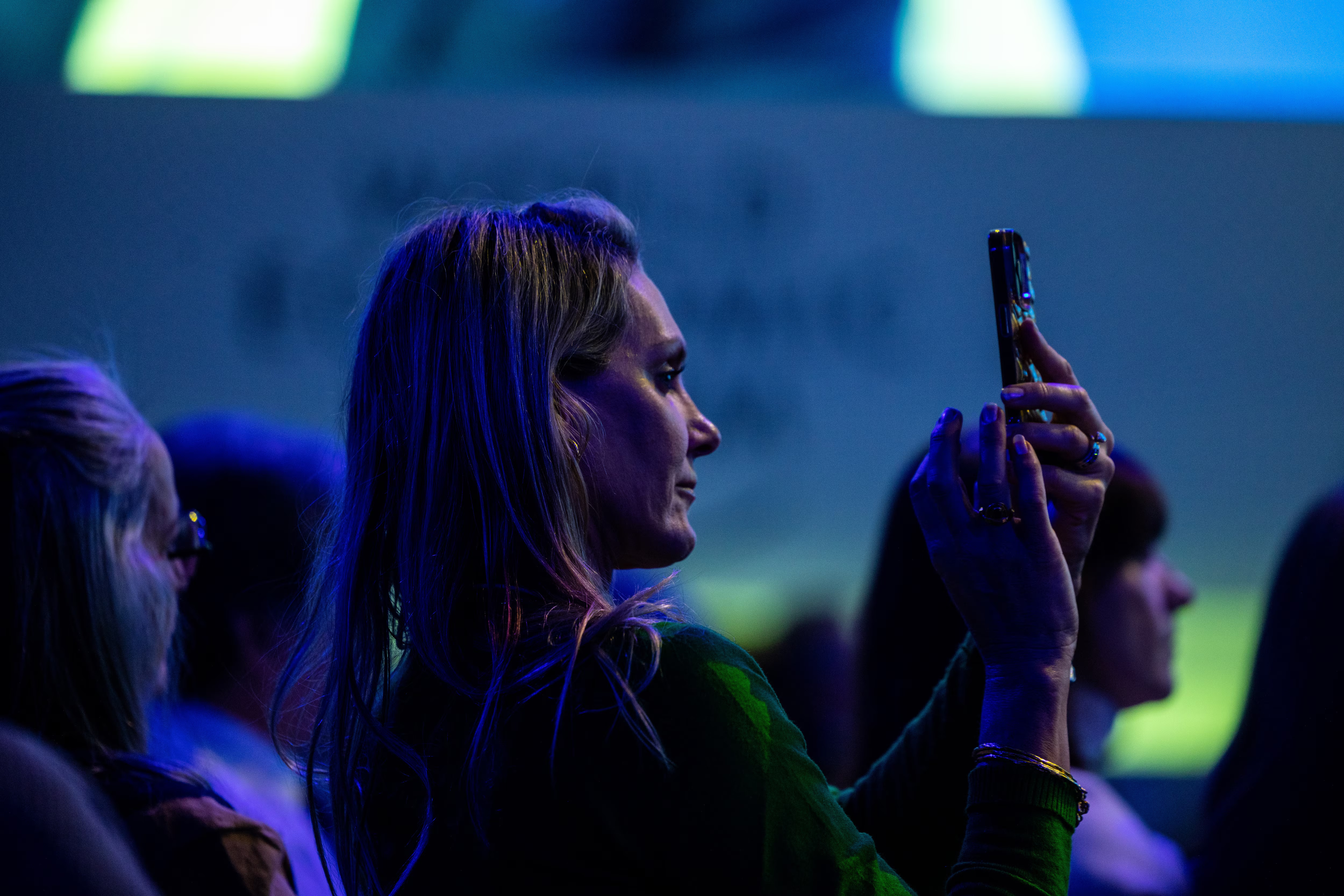Davos 2023 Day 5: Inflation, AI, and women of influence
播客文字稿
This transcript has been generated using speech recognition software and may contain errors. Please check its accuracy against the audio.
Robin Pomeroy: It's Friday, the 20th of January, and from the World Economic Forum's Annual Meeting, 2023, this is Radio Davos.
Angelique Kidjo: [singing]
Robin Pomeroy: Singer Angelique Kidjo and cellist Yo-Yo Ma struck up an impromptu performance just outside the Radio Davos studio. It kept us from recording any interviews for a while, but not for long. On this episode, European Central Bank chief Christine Lagarde insists inflation will come back under control.
Christine Lagarde, President, European Central Bank: Inflation, by all accounts, however you look at it, is way too high. And our determination at the ECB is to bring it back to 2%.
Robin Pomeroy: In the Radio Davos booth, Vilas Dhar, an expert on the impact that Artificial Intelligence will have on us, all says the human touch will always be important.
Vilas Dhar, President, Patrick J. McGovern Foundation: Is getting closer and closer to replicating some of those fundamental human experiences: poetry, music, art. And yet the human element of it matters so much more for the quality of the product and AI gives you.
Robin Pomeroy: And Prajakta Koli, a social media influencer from India, reflects on her first time in Davos.
Prajakta Koli, Influencer & UNDP affiliate: It's been a lot, honestly. I had heard so much about this place, but being here is a whole different experience. Valuable, impactful conversations are happening. What I want to do is kind of learn, pick up on things, get fresh perspective, meet other young people, collaborate maybe, and take that back home and see how I can put that to use in my socials.
Robin Pomeroy: To listen back to our daily coverage of Davos 2023. Subscribe to Radio Davos wherever you get your podcasts or visit wef.ch/podcasts. Follow the action here live and on catch up on wef.ch/wef23 and across social media using the hashtag #wef23. I'm Robin Pomeroy at the World Economic Forum. And on this, the last day of Davos, 2023.
Vilas Dhar: This is this amazing moment in time that we're in.
Robin Pomeroy: This is Radio Davos. Welcome to Davos and welcome to Davos to my co-hosts for today, Emily Maitlis and Jon Sopel. Hi, Emily.
Emily Maitlis, Journalist & Host, The News Agents: Hi Robin.
Robin Pomeroy: Hi Jon.
Jon Sopel, Journalist & Host, The News Agents: Hello. Hello. Lovely to be with you.
Robin Pomeroy: So happy to have you here. Big fan of your podcast, The News Agents, If anyone’s not heard it, which one of you is going to tell us what it is?
Emily Maitlis: I think we've come from a world in which there were stories that we felt we had to do, you know, in block capitals. And now editorially, we come to the meeting with our producers and editors and just say what is interesting? I mean, it's a very, very simple question. What would you want to be talking about? What do people want to hear about? What are people talking about? And so that is the only agenda. Not only have we check that box and have we made sure we've covered that, and wouldn't it be wrong not to include that? What's interesting, what are people talking about? And so it's a daily news podcast show with social media sort of content as well. And The News Agents is really appealing to people who've actually not come to news before. And so, we're getting a lot more younger listeners, a lot of people who wouldn't think of themselves as news junkies. Newsagents is both a high bar and a low bar in the sense that the bar is high. If you've heard it elsewhere, we don't want to do it. And it's also low. If it's a really interesting subject, yeah, great. Let's talk.
Robin Pomeroy: So talking of interesting subjects, let's bring the conversation to Davos, you’re a seasoned journalist. You must have been at Davos before.
Emily Maitlis: First timer, old hander.
Robin Pomeroy: Here on the last day of this Davos 23. There's a couple of hugely heavy sessions, unmissable ones. And I'm just going to, for our listeners, read out in case they want to catch these, watch them live on the website. What next for monetary policy at 9:00 in the morning with Larry Summers, who was a Secretary of Treasury in the Clinton administration with the head of the Swiss National Bank, with the head of Norway's largest financial services firm, with the head of the governor of the Central Bank of Peru. Monetary policy. It's one of those things that maybe at the World Economic Forum, it's a term that’s bandied around. I'm sure that you've covered it. We probably don't need to mention that word so much, but the monetary policy in the UK has been a shock, hasn't it?
Emily Maitlis: The new government came in and followed what they called a pro-growth strategy, but the way they did it spooked the markets to the point where the actual pensions market was crashing. The Bank of England had to step in and it was a really scary moment actually, for people trying to get mortgages. They pulled 4,000 mortgage offers off the shelves.
Robin Pomeroy: It's true. That's a big story in the UK. I'm British myself, but also all over the world. Now the central banks are putting up interest rates, which is slowing down growth. And we're looking at, we’ve done podcasts on this, probable global recession or regional recessions. So for people interested in this, it will be pointy headed, but it's going to be very interesting and important. 9:00 today, What next for monetary policy? There's another one. Larry Summers will then go, 11:00 Global Economic Outlook. Is this the end of the era? It’s got the head of the IMF, it’s got the European Central Bank, it’s got France's economy minister and it's got the head of the Bank of Japan. That is one big panel. Global Economic Outlook. Is this the end of an era? I don't know whether they're talking about is this the end of cheap money, which is what we were talking about, or is it the end of kind of properly globalised capitalism? I mean, are we entering a new era globally, do you think?
Jon Sopel: I think that what you're going to see is a correction. You know, you go back 15 years, which is I think the first time I came to Davos, so 17 years ago when Blair was prime minister. It was very much globalisation was the future. This was going to lift BRIC countries, everybody trading globally. And I think there has been a correction and I think you saw the economic nativism of Donald Trump and economic nationalism, which I don't think has changed actually since Joe Biden became President in the United States. But you saw with the pandemic the impossibility and the clamour to buy PPE, to buy this protective clothing, the plastics, the gloves, the masks from anywhere you can, and the scramble to get ahold of this stuff. And I think that made people think, oh, that's not great. Maybe we do need to have some core manufacturing in our own countries to do this. And I think the other thing is food security, and the possibility that food supply chains could break down and that we need to be growing more in our own countries so that we can feed our own populations. And I think that as well has actually caused a rethinking of some aspects of globalisation.
Robin Pomeroy: Wonderful. Well, all of those issues have been big issues here all this week. People can go back, watch those sessions, they can listen back to Radio Davos where we've touched on this before, the reshoring, I think it was Wednesday’s or Tuesday’s with Secretary of Bloomberg Zero talking about how Europe and America are now competing for green technology investment. This is a really a new thing over the last 12 months or so. Fascinating subjects. So delighted you joined us today. Thank you to Emily Maitlis and to Jon Sopel. Thanks for joining me on Radio Davos. Thank you.
Emily Maitlis: Thanks Robin, lovely to be here.
Robin Pomeroy: The economy, as we heard, is top of the agenda today. And yesterday we heard one of the world's most important figures in economic matters. Christine Lagarde, head of the European Central Bank. Like all central bank chiefs, her main task right now is getting inflation under control. Here is Christine Lagarde speaking at a session on Thursday.
Christine Lagarde: Inflation, by all accounts, however you look at it, is way too high. And our determination at the ECB is to bring it back to 2% in a timely manner and taking all the measures that we have to take in order to do that, which is why we have already increased interest rates by 250 basis points. And we shall stay the course until such time when we have moved into restrictive territory for long enough so that we can return inflation to 2% in a timely manner.
Robin Pomeroy: Christine Lagarde of the European Central Bank, speaking at a session called Finding Europe's New Growth. Search for that on the website. You can watch the whole thing back again, or you can choose to listen to it as a podcast. Search for Agenda Dialogues wherever you get your podcasts. And that episode should be up there with the whole thing just to listen to. From one influential woman to another, very different one. Prajakta Koli is a young woman from India who's well known for funny online videos. As a successful YouTuber, she's turned her talents to some serious subjects as well. As you'll hear in this conversation with her that I recorded on the chilly Promenade in Davos. I started by asking Prajakta to tell us about her channel.
Prajakta Koli: So my YouTube channel is called Mostly Sane and I started eight years ago. I started primarily with comedy content, but eventually I kind of also started doing a lot of social conversations, which were very organic to my audience and me. So it started with mental health and body positivity, went into girls’ education and have I recently started speaking about climate change. So, I partnered up with UNDP and.
Robin Pomeroy: The United Nations Development Programme.
Prajakta Koli: Development Program Development Programme, yeah. And it's been great. It's my first deal with them and I'm looking forward to it.
Robin Pomeroy: So you're making content for UNDP?
Prajakta Koli: Yes.
Robin Pomeroy: What kind of stuff do they want?
Prajakta Koli: Basically, I just feel like as content creators in a country like ours, we have a regional impact. So, from India, and I would love to be the kind of kind of like a vehicle or an amplifier of conversations that people who have been doing great work already could use help from. I'm just trying to be the bridge.
Robin Pomeroy: Okay. And your first time in Davos?
Prajakta Koli: It is my first time, yes.
Robin Pomeroy: What does a YouTube do in Davos? What kind of stuff have you been getting?
Prajakta Koli: It's been a lot, honestly. I had heard so much about this place, but being here is a whole different experience. So I'm here and I'm in rooms where very valuable, impactful conversations are happening. So what I want to do is kind of learn, pick up on things, get fresh perspective, meet other young people, collaborate maybe and take that back home and see how I can put that to use on my socials.
Robin Pomeroy: Have you been making content while you’re here, or are you waiting until you get home?
Prajakta Koli: Both. I've been making a bunch of content here and I'm looking forward to making some more when I'm back.
Robin Pomeroy: Okay. Are they still funny or videos?
Prajakta Koli: I mean, I find them funny.
Robin Pomeroy: I was speaking to a Prajakta Koli on the Promenade, the name of the main street just outside the Conference Centre here in Davos. Back in the warmth of the Conference Centre, I welcome to the studio a man who's been both a computer scientist and a lawyer and perhaps combines both those skills in his role as president of the Patrick J. McGovern Foundation, a philanthropic organization that aims to help us achieve technological advances that are ethical, fair and sustainable. I asked Vilas Dhar to tell us about the tech that everyone is talking about: generative AI.
Vilas Dhar: So this term generative AI, it refers to an entire class of new technologies that are being built that take a human input, a lot of learning about what the world looks like and generates something bigger and broader. For example, I might go to one of these systems and say write me a short story about some of my favourite childhood characters, and the system will actually create a 500 word story for you that reflects some of the best kind of stylistic authors of the day. These are tools that take again, a person's idea but create real formal structures around it and give a product that can be distributed out to the world. It's quite an amazing thing that AI does. But let's be clear that this isn't something that by itself will change the world. I'll give you an example. I grew up in a family where my mother would make dinner every night, and she did it with such love. She would spend hours and we would come together and we would sit together and we would eat that food. Well, there is a possibility that by metaphor, you know, an AI system might be able to be a robot chef. You might be able to learn exactly the ingredients, the proportions, the ways they're put together. And it might be the kind of thing where you come home and you say, whatever your AI is named, make me a meal. I can tell you that those two things might be almost exactly the same. In fact, if you put on a blindfold and you had a spoon of each plate, you might not be able to tell which was made by AI and which was made by my mother. But you know what? When I'm told which plate was made by a human, suddenly it would matter a lot more to me. This is this amazing moment in time that we're in, where AI is getting closer and closer to replicating some of those fundamental human experiences. Poetry, music, art. And yet the human element of it matters so much more than the quality of the product an AI gives you.
Robin Pomeroy: Vilas Dhar, President of the Patrick J. McGovern Foundation. You can hear more of that interview on a later episode. Immy Humes is an Oscar nominated documentarist who is in Davos to display the photographs that make up her book, The Only Woman, going back through the history of photography, the pictures all show a lone woman surrounded by men. And these pictures speak a thousand words on the subject of gender equality and empowerment.
Immy Humes, Filmmaker & Documentary Producer: It's a picture book. It's 100 archival photos from all over the world. It's 20 nations and even one in space from the beginning of photography to now. And they are group photos, in public places in other words, public space, let's put it that way. And they have only one thing in common. They're group portraits of men, big bunches of men, with one single woman amongst them. So, it could be Mrs. Madame Curie at Solvay, you know, with Einstein and company all sitting there. And then she's right there, head in hand in the middle. Or it could be some unknown worker who is mysteriously amongst a bunch of metal workers in a shipyard. So it's a really wide range of situations with this only one common trope. Well, this photo is quite well known, at least a picture to people of my generation and nationality, etc.. But this is a photo, a Life magazine photo from 1951, a decade earlier than the other one, but of all the most famous New York, really American artists, there. Abstract Expressionism, with Jackson Pollock and Mark Rothko and de Kooning and you name it, they're there and they're all looking very serious in business suits, arranged themselves in this tight composition and then standing. Can you describe it?
Robin Pomeroy Yes, there’s, what, almost a dozen men there in suits, very artfully arranged, I would say, and then yet looming above them, although at the back, is I suppose Heather Stern.
Immy Humes Yes.
Robin Pomeroy: The only woman in this photograph, in a dress holding a handbag, staring into camera.
Immy Humes: Yes. She's got quite an extraordinary placement in the picture. She's in the back and much, much higher up in all of them. And I note that the photo was taken by a woman.
Robin Pomeroy: Nina Leen.
Immy Humes: Yes. And so, Heather Stern, most people look at this picture, and me included, and said, well, who is she? Because the other guys are so famous. And she was fairly- is still fairly unknown, but she turns out to be, in fact, well, a really great artist who lived to be 100. She outlived them all, but she said, she reported about this moment, that the guys were really actually very angry. They really didn't want her in the photo because they felt it would detract from the seriousness of their mission. Because they were on a mission with this photo. They were orchestrating a protest.
Robin Pomeroy: A protest about what?
Immy Humes: About the policies of the Metropolitan Museum of Art towards modern art. It is amazing, of course, to see now people like to see this scene, which I hope looks so ridiculous to us.
Robin Pomeroy: It's funny when you explain this sort of picture, you see the picture quite differently. You know, I'm looking at these men now, imagining that some of these stern faces, they might get annoyed that she's coming in and she's looking over quite defiantly, but maybe there's a note of intimidation, possibly. It depends what the viewer brings to it, right. But it's very different experience when you know something about the story of the picture.
Immy Humes: It's very powerful.
Robin Pomeroy: Immy Humes. Her book with those photos in is called The Only Woman. Thanks to Immy, and thanks to all our guests on Radio Davos this week. If you haven't heard the other four episodes, you can find them on your podcast app or at wef.ch/podcasts, where you'll also find our sister podcasts, Meet the Leader, Agenda Dialogues and the World Economic Forum Book Club Podcast. I hope you've enjoyed these episodes. Radio Davos will return to its usual weekly schedule. If you're not familiar with the normal programme, we look at the world's biggest challenges and how we might solve them. Please do join me on that and subscribe. Give us a rating, maybe even a review. And if you want to discuss podcasts, these podcasts or others, head to the World Economic Forum Podcast Club on Facebook. You can catch up on all that's been happening here at Davos 2023 at wef.ch/wef23 and across social media using the hashtag #wef23. This episode of Radio Davos was written and presented by me, Robin Pomeroy. Editing was by Taz Kelleher. Studio Engineering was by Juan Toran. Thanks also to Gareth Nolan and Linda Lacina. We will be back with a weekly Radio Davos soon. But for now, thanks to you for coming with me to Davos 2023, and goodbye.
Emily Maitlis and Jon Sopel of the News Agents podcast join us to look at the final day at #wef23 where the global economy is in focus.
Also: European Central Banker Christine Lagarde says she will take all measures needed to get inflation down; YouTuber Prajakta Koli on her first Davos experience; AI expert Vilas Dhar on the human side of technology; documentarist Immy Humes on her historic photos showing one woman among a group of men; and Yo-Yo Ma and Angélique Kidjo give an impromptu concert outside the podcast studio!
People in this episode:
Yo-Yo Ma, cellist
Angélique Kidjo, singer
Emily Maitlis, Jon Sopel, hosts of the News Agents podcast
Vilas Dhar, President, Patrick J. McGovern Foundation
Prajakta Koli, YouTuber
Christine Lagarde, European Central Bank President
Immy Humes, documentary maker and author of The Only Woman
Sessions relevant to this episode:
Subscribe on any platform: https://pod.link/1504682164
Join the World Economic Forum Podcast Club
Follow all the action from the World Economic Forum’s Annual Meeting 2023 at wef.ch/wef23 and across social media using the hashtag #WEF23.
分享:
更多集:
每周 议程
每周为您呈现推动全球议程的紧要问题(英文)
